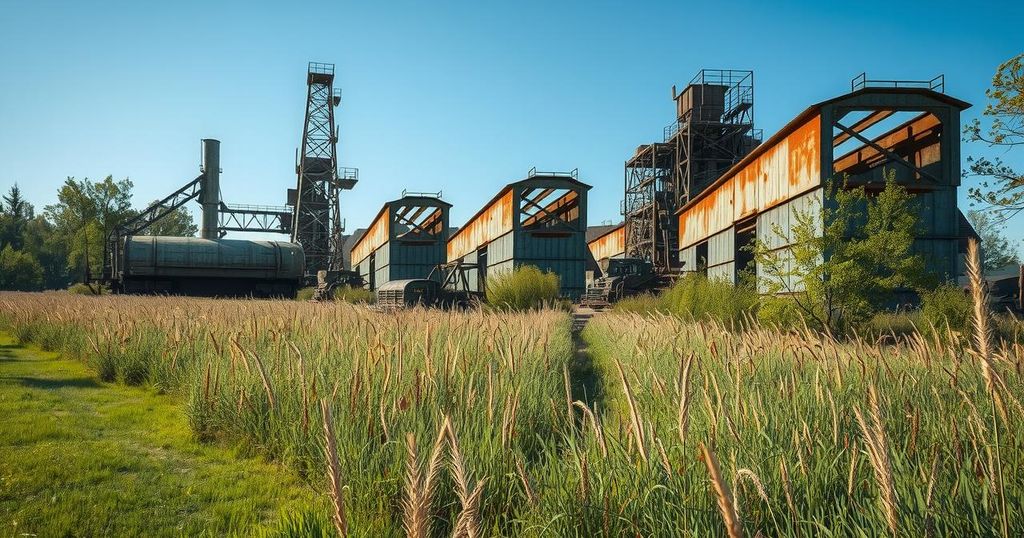Fracking-Powered Crypto Mine in Pennsylvania Abruptly Closes, Raising Environmental Concerns
A Pennsylvania fracking-powered crypto mine, Longhorn Pad A, has abruptly shut down, leading state regulators to find it abandoned. Diversified Energy started operations in late 2022 without an air quality permit and faces backlash over environmental concerns due to abandoned wells. The state is struggling with hundreds of thousands of orphaned wells, raising questions about potential long-term pollution risks and cleanup responsibilities.
A fracking-powered cryptocurrency mine in Pennsylvania has shut down unexpectedly, leaving state regulators to discover the site abandoned. Located in Horton Township, the Longhorn Pad A well pad had only just restarted operations in late 2022, drawing on natural gas without a necessary air quality permit. The abrupt closure raises serious concerns about environmental repercussions, particularly the state’s large number of orphaned oil and gas wells.
The mine was positioned to fuel cryptocurrency operations using gas from the Longhorn Pad A, which had stood idle for nearly a decade before Diversified Energy revived it. While the company claimed to innovate by making economically unviable wells profitable through crypto mining, they have left behind potential environmental hazards. Pennsylvania is already grappling with approximately 350,000 abandoned oil and gas wells—predominantly due to the financial burdens of remediation.
Diversified insists it has not abandoned these wells, although state assessments tell a different story. After a site visit uncovered the removal of mining equipment and cry for compliance, the Pennsylvania Department of Environmental Protection issued a notice of violation. Typically, plugging wells costs upwards of $100,000, a financial obligation that many operators try to forget.
This situation is compounded by ongoing environmental concerns that have surrounded Diversified Energy. The firm has amassed a sizeable collection of aging and economically underperforming gas wells across states like Pennsylvania, Ohio, and West Virginia. Pressure is mounting as local residents, alongside environmental groups, argue about who will shoulder the cleanup costs once these wells are left neglected, particularly when they began as viable economic ventures.
Critically, the Longhorn Pad A wells were originally drilled by EQT in 2011 but were left dormant until Diversified’s revival. After launching crypto mining operations without crucial permits, questions grew about the company’s intentions. Although regulators authorised a permit for the crypto mining in December 2023, a lack of communication from Diversified regarding site plans has worried local officials.
Charles McPhedran of Earthjustice warned that Diversified cannot be allowed to abandon its responsibilities. In stark contrast, the Pennsylvania Game Commission has reported they do not consider the wells abandoned and push for further action from the company to maintain operations. However, the Department of Environmental Protection is clear, having stated the wells are unequipped for production.
The concerns surrounding Diversified extend to its business model, which is increasingly likened to a temporary fix rather than a sustainable strategy. A report from the Ohio River Valley Institute highlights where Diversified has acquired wells, exploiting them until they can no longer yield profit, leaving behind a potential multi-million dollar liability for stakeholders.
Despite these challenges, Diversified boasts aggressive expansion plans, including partnerships aimed at utilising the very gas they seek to abandon. Yet doubts linger about their capacity to manage their liabilities effectively. The implications could be significant: as local supervisor PJ Piccirillo notes, Tanya communities are left with unanswered questions about abandoned infrastructure.
Each step taken will potentially affect not just Pennsylvania’s environment but also the broader Appalachian region, fishing for accountability that might ensure future economic and environmental stability.




Post Comment